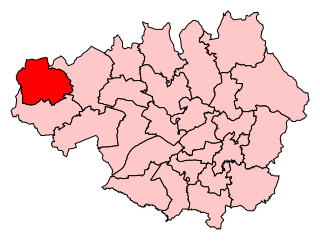Related Research Articles

Rear Admiral Sir Edward Thomas Troubridge, 2nd Baronet, was an officer of the British Royal Navy who served in the French Revolutionary, Napoleonic and War of 1812. He later served for fifteen years as the member of parliament for Sandwich, Kent.

Wigan is a constituency in Greater Manchester, represented in the House of Commons of the UK Parliament since 2010 by Lisa Nandy of the Labour Party, who currently serves as the Shadow Cabinet Minister for International Development.

Sir Edward Knatchbull, 9th Baronet, was a British Tory politician. He held office under Sir Robert Peel as Paymaster of the Forces between 1834 and 1835 and as Paymaster General between 1841 and 1845.

Sir Thomas Gladstone, 2nd Baronet was a Tory politician from Liverpool, who returned to the ancestral seat in the Highlands to become a country squire. Less well known than his brother William, Tom, as he was known, was both a principled and honest man who supplied his brother with good advice. Their contrasting characters informed rising social and economic liberalism during the Victorian period. Tom was parsimonious, even mean, while his brother was constantly battling family debts.
Sir Hedworth Williamson, 7th Baronet was an English Whig politician who sat in the House of Commons in two periods between 1831 and 1852. He was educated at St John's College, Cambridge.

John Charles George Savile, 4th Earl of Mexborough, styled Viscount Pollington between 1830 and 1860, was a British peer and Tory politician. He impressed his friends enough to be twice fictionalised, and at his death he was the last surviving person to have been elected a Member of the House of Commons before the passing of the Reform Act in 1832.
Roderick Macleod 4th of Cadboll was a Scottish Whig politician.

Richard Potter (1778–1842) was a radical non-conformist Liberal Party MP for Wigan, and a founding member of the Little Circle which was key in gaining the Reform Act 1832.
Captain Thomas Tyrwhitt-Drake was a British Member of Parliament (MP) for Amersham from 1805 to 1832.
Sir Grey Skipwith, 8th Baronet was an English Whig politician from Warwickshire.
William Downe Gillon was a Scottish Whig politician.
James Blair was a Ulster-Scots owner of plantations in the West Indies. He entered Parliament as a Tory in 1818 to protect the interests of slave-owners. Blair sat in the House of Commons from 1818 to 1830, and later from 1837 to 1841.
Admiral Theobald Jones, also known as Toby Jones, was an Irish officer in the British Royal Navy, a Tory politician, a noted lichenologist, and a fossil-collector. The County Londonderry-born son of a Church of Ireland clergyman, Jones was descended from a 17th-century Welsh settler in Ireland. Several generations of his family had held public office in the Kingdom of Ireland, including membership of the pre-union Parliament of Ireland.

George Robert Smith was an English banker and Whig politician. His great-grandfather was Thomas Smith, founder of Smith's Bank; his father George Smith (1765–1836) was a director of the East India Company.
John Frederick Lees was a British landowner and Liberal Conservative politician who represented Oldham in the House of Commons of the United Kingdom as a Member of Parliament from 1835 to 1837.
William James was an English Radical politician. A Liverpool-born slave-owner, he sat in the House of Commons as a Member of Parliament (MP) for constituencies in Cumberland for twenty years over the three decades from 1820.
George John Forbes, Viscount Forbes was an Irish aristocrat who represented County Longford in the House of Commons from 1806 to 1832, and 1833 to his death in 1836.
John Wood was a British Whig politician, MP for Preston 1826–1832.
William Charles Wentworth-FitzWilliam, Viscount Milton, was an English nobleman and politician. He served in Parliament from 1832 to his death in 1835, and was one of the youngest people to serve in Parliament in the modern era.
John Foster Barham was a British politician.
References
- 1 2 3 4 Fisher, David R.; Bairstow, Stephen (2009). "KEARSLEY, John Hodson (1785-1842), of Standishgate, Wigan and Higher Hall, Westleigh, Lancs.". The History of Parliament: the House of Commons 1820-1832. Cambridge University Press.
- ↑ Fisher, David R.; Bairstow, Stephen (2009). "HODSON, James Alexander (1788-1832), of Grove-within-Upholland, nr. Wigan, Lancs.". The History of Parliament: the House of Commons 1820-1832. Cambridge University Press.
- ↑ M. Stenton, ed. (1976). Who's Who of British Members of Parliament: Volume I 1832-1885. Harvester Press. p. 216.